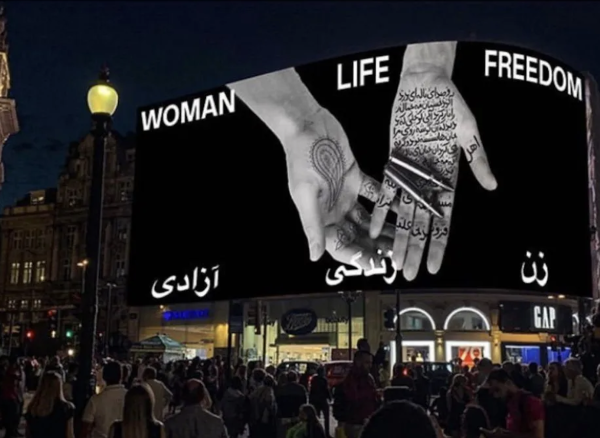Women and Revolutionary Art in Iran
Orkideh Torabi, Nahid Siamdoust, Niloofar Sarlati, and Kathryn Babayan

Monday, September 25, 2023
7:00-8:30 PM
East Conference Room, 4th floor
Rackham Graduate School (Horace H.)
Map
Iranian women have been protagonists in revolutionary movements from the Constitutional Revolution (1905) to the Iranian Revolution (1979), the civil rights movements of 2009 (Green Movement), and more recently the 2022 Woman, Life, and Freedom Movement. They have been fighting for voting rights, gender and ethnic equality, freedom of assembly and of expression as well as the right to a dignified life. Using the media of the arts, the three panelists will discuss the visual and performative language of activism to think about the role of gender and the visual arts in revolutionary Iran.
About the panelists:
Orkideh Torabi was born in Tehran and earned her MFA from the School of the Art Institute of Chicago in 2016 and she received her MA and BFA from The University of Art in Tehran. Through her vibrant and intricate paintings, Torabi challenges traditional notions of femininity, power dynamics, and identity. Her unique artistic style blends elements of Persian miniature painting with contemporary imagery, blurring the boundaries between the past and the present.
Nahid Siamdoust is an assistant professor of Middle East Studies at the University of Texas. She is the author of Soundtrack of the Revolution: The Politics of Music in Iran.
Niloofar Sarlati is an assistant professor of Comparative Literature and English Language and Literature at U-M. Her publications include “Suspicious Gifts, Skeptical Words, and Speculative Translations: Colonial and Semicolonial Encounters Between English and Persian” forthcoming in Comparative Literature .
Kathryn Babayan, moderator, is a professor in Middle East Studies and History at U-M. She is the author of The City as Anthology: Visualizing Cultures of Literacy in Early Modern Isfahan.
Orkideh Torabi is the 2023 Jean Yokes Woodhead Visting Fellow at the Institute for the Humanities. This event is part of the LSA's fall 2023 Arts & Resistance theme semester.
About the panelists:
Orkideh Torabi was born in Tehran and earned her MFA from the School of the Art Institute of Chicago in 2016 and she received her MA and BFA from The University of Art in Tehran. Through her vibrant and intricate paintings, Torabi challenges traditional notions of femininity, power dynamics, and identity. Her unique artistic style blends elements of Persian miniature painting with contemporary imagery, blurring the boundaries between the past and the present.
Nahid Siamdoust is an assistant professor of Middle East Studies at the University of Texas. She is the author of Soundtrack of the Revolution: The Politics of Music in Iran.
Niloofar Sarlati is an assistant professor of Comparative Literature and English Language and Literature at U-M. Her publications include “Suspicious Gifts, Skeptical Words, and Speculative Translations: Colonial and Semicolonial Encounters Between English and Persian” forthcoming in Comparative Literature .
Kathryn Babayan, moderator, is a professor in Middle East Studies and History at U-M. She is the author of The City as Anthology: Visualizing Cultures of Literacy in Early Modern Isfahan.
Orkideh Torabi is the 2023 Jean Yokes Woodhead Visting Fellow at the Institute for the Humanities. This event is part of the LSA's fall 2023 Arts & Resistance theme semester.
| Building: | Rackham Graduate School (Horace H.) |
|---|---|
| Website: | |
| Event Type: | Lecture / Discussion |
| Tags: | Art, History, Humanities, Middle East Studies, Multicultural, Scholarship, Visual Arts, Women's Studies |
| Source: | Happening @ Michigan from Institute for the Humanities, Department of Middle East Studies |

